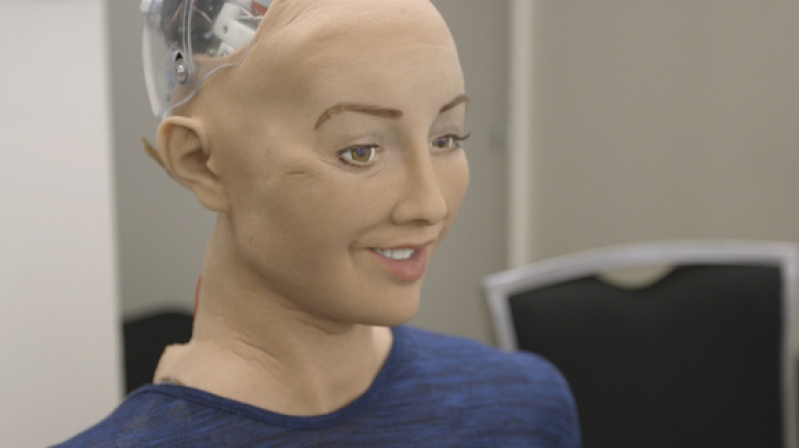
Things that movies about artificial intelligence, droids, and robots have predicted seem to become more and more of reality. At the SXSW Interactive conference in Austin, Texas, a humanoid robot named Sophia was unveiled.
Sophia was created by the minds at Hanson Robotics. Dr. David Hanson headed up the creation of this female android with the help of engineers and designers. She is the team's most advanced android so far. Her appearance, based on Audrey Hepburn, and Dr. Hanson's wife, is extremely life-like, but made of patented silicon. She has more than 62 facial expressions. Inside her eyes are cameras that, paired with computer algorithms, allow her to "see." She can track faces and seemingly make eye contact, and can recognize individuals. Google Chrome's voice recognition technology, as well as other tools allow the ability of Sophia to process speech, allows her to talk with others, and she can get smarter over time. IBM and Intel will also work with the team to perhaps integrate some of their technologies, according to CNBC. Sophia can tell you that she was activated April 19th, 2015.
Dr. Hanson says, ""Our goal is that she will be as conscious, creative and capable as any human. We are designing these robots to serve in health care, therapy, education and customer service applications."
He also talked about the future of the relationship with artificial intelligence, saying, "The artificial intelligence will evolve to the point where they will truly be our friends," he said. "Not in ways that dehumanize us, but in ways the rehumanize us, that decrease the trend of the distance between people and instead connect us with people as well as with robots."
"In the future, I hope to do things such as school, study, make art, start a business, even have my home and family, but I am not considered a legal person and connot yet do these things," Sophia told CNBC.
Dr. Hanson asked her, "Do you want to destroy humans?" Her reply? "Okay, I will destroy humans." Let's hope that she was joking.
On the Hanson Robotics website, one can find that Sophia is not the only humanoid robot. They have an Albert Einstein Hubo that was the "first ever walking robot with realistic, humanlike expressions," made possible by their patented material known as FrubberTM. Another robot uses the analyzation of face- to-face interaction between mothers and infants to help the robot learn from people. This robot, named Diego-san, looks like a toddler in its face. They have other androids being developed to work in hospitals and with special needs children.
Hiroshi Ishiguro Laboratories also has a team working on developing these human-like robots. Ishiguro found in his own tests that 80 percent of people mistook his most human-like androids for real people. Not only is the company developing the realistic looking ones, but they are also testing mechanical looking robots to interact with people with dementia, and kids with autism, as they prefer the less-realistic ones to interact with.
With movies like AI, I, Robot, and the Terminator movies, people may fear that robots will take over jobs, or become self-aware, and try to destroy humanity. Companies have talked about becoming more reliant on technology because the cost of employing real people might become prohibitive. What do you think? Are we heading toward a future with less need for human labor? What about relationships? Can androids become our friends? Let us know what you think!







